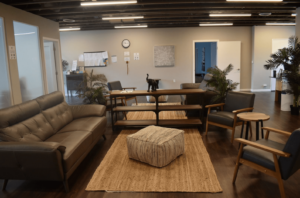Living with co-occurring mental health and substance use disorders presents unique challenges that require specialized treatment approaches. At Tres Vistas Recovery, we understand that addressing both conditions simultaneously is essential for lasting recovery. Among our comprehensive treatment services, group therapy stands out as a particularly effective component for individuals with dual diagnosis.
Understanding Dual Diagnosis
Dual diagnosis, or co-occurring disorders, refers to the presence of both a mental health disorder and a substance use disorder. According to the Substance Abuse and Mental Health Services Administration (SAMHSA), approximately 9.2 million adults in the United States experienced both mental illness and a substance use disorder in 2021.
These conditions often interact in complex ways, with each potentially exacerbating the symptoms of the other. For example, individuals may use substances to self-medicate symptoms of depression or anxiety, while substance use can worsen existing mental health symptoms or trigger new ones. This complexity necessitates integrated treatment approaches that address both conditions concurrently rather than treating them in isolation.
Why Group Therapy Works for Dual Diagnosis
Group therapy provides unique benefits that make it particularly valuable for individuals navigating dual diagnosis:
1. Reduced Isolation and Stigma
Many individuals with co-occurring disorders experience profound isolation, believing their struggles are unique. According to the National Alliance on Mental Illness (NAMI), group settings allow participants to meet others facing similar challenges, reducing feelings of isolation and the stigma associated with both mental health conditions and addiction.
The validation and normalization that occur when hearing others share similar experiences can be profoundly healing. Many clients report that simply knowing they’re not alone in their struggles constitutes a significant turning point in their recovery journey.
2. Multiple Perspectives and Feedback
In group therapy, participants benefit from diverse viewpoints and experiences. This collective wisdom often provides insights that individual therapy alone might not generate. Group members can offer feedback on coping strategies, medication experiences, and recovery challenges from firsthand experience.
When someone shares a particular struggle—such as managing medication side effects while maintaining sobriety—others who have navigated similar challenges can offer practical solutions that clinicians may not have considered. This peer-to-peer learning creates a rich repository of recovery knowledge.
3. Development of Social Skills
Many individuals with dual diagnosis struggle with social interaction due to symptoms of their conditions or prolonged isolation during active addiction. Research published in the Journal of Substance Abuse Treatment indicates that group therapy provides a safe environment to practice communication skills, emotional regulation, and healthy boundary setting under therapeutic guidance.
For those whose mental health conditions include social anxiety or whose substance use has damaged interpersonal relationships, the structured setting of group therapy offers a controlled environment to rebuild these crucial skills. The immediate feedback available within the group setting accelerates this learning process.
4. Witnessing Recovery in Action
Seeing others at different stages of recovery creates hope and practical roadmaps for those just beginning their journey. Group members who have achieved longer periods of stability can demonstrate that recovery is possible and share specific strategies that have worked for their particular combination of conditions.
This “therapeutic optimism” is especially important for dual diagnosis clients, who often face particularly complex recovery challenges and may have experienced multiple treatment failures in the past. Witnessing others overcome similar obstacles provides concrete evidence that recovery is possible.
5. Accountability and Motivation
Group settings naturally foster accountability in ways that individual therapy sometimes cannot. Knowing that peers will inquire about progress toward goals or notice absences can provide additional motivation to stay committed to recovery efforts. The Psychiatric Rehabilitation Journal has documented that this peer accountability significantly improves treatment adherence in dual diagnosis populations.
Types of Group Therapy for Dual Diagnosis at Tres Vistas Recovery
At Tres Vistas Recovery, our group therapy program incorporates several evidence-based approaches specifically beneficial for dual diagnosis:
Psychoeducational Groups
These groups focus on education about both mental health conditions and substance use disorders. Participants learn about:
- The biology of addiction and mental illness
- Medication management and the importance of adherence
- Identifying triggers and warning signs unique to their specific conditions
- The interaction between substances and psychiatric symptoms
- Self-advocacy skills within the healthcare system
Understanding the neurobiological basis of both conditions helps reduce self-blame and stigma while increasing treatment engagement. Our facilitators use accessible language and interactive methods to make complex medical information understandable and relevant.
Skills Development Groups
These sessions help members develop practical coping skills, including:
- Stress management techniques such as progressive muscle relaxation and breathwork
- Emotion regulation strategies to handle intense feelings without substance use
- Communication skills for expressing needs clearly and resolving conflicts
- Relapse prevention planning for both mental health symptoms and substance use
- Mindfulness practices that support recovery from both conditions
These skills are taught experientially, with opportunities to practice in-session and receive supportive feedback from both facilitators and peers.
Process-Oriented Groups
In these therapeutic sessions, members explore underlying emotional issues, trauma, and relationship patterns that contribute to both mental health symptoms and substance use. This deeper work helps address root causes rather than just symptoms.
Facilitators create safe environments for this vulnerable work, ensuring appropriate emotional containment while encouraging authentic expression. These groups often become the emotional heart of the treatment experience, where profound healing and connection occur.
Specialized Dual Diagnosis Groups
Unlike general addiction recovery groups, our specialized dual diagnosis groups directly address the interaction between specific mental health conditions and substance use. These groups might focus on:
- Managing bipolar disorder and substance use
- Depression and addiction recovery
- Anxiety disorders and substance dependence
- PTSD and addiction
- ADHD and substance use disorders
This specificity allows for targeted interventions and shared experiences among those facing similar dual diagnosis challenges.
The Integrated Approach
What makes group therapy particularly effective in dual diagnosis treatment is its integration with other treatment modalities. At Tres Vistas Recovery, group therapy doesn’t stand alone but works in conjunction with:
- Individual therapy for processing deeply personal material
- Medication management with psychiatrists experienced in addiction medicine
- Family therapy to repair relationships and build support systems
- Holistic approaches like yoga and nutrition that support overall wellbeing
According to the Journal of Dual Diagnosis, this integrated approach yields significantly better outcomes than treating either condition in isolation.
Our treatment team meets regularly to coordinate care across these modalities, ensuring that insights gained in group sessions inform individual treatment and vice versa. This seamless communication creates a cohesive treatment experience that addresses the whole person.
Overcoming Barriers to Group Participation
Despite its benefits, some individuals may initially resist group therapy due to:
- Social anxiety or paranoia related to their mental health condition
- Privacy concerns about discussing sensitive mental health and addiction issues
- Past negative experiences in groups or treatment settings
- Cognitive difficulties that make following group discussions challenging
Our experienced facilitators at Tres Vistas Recovery are skilled at helping participants navigate these challenges. We create safe, supportive environments where members can engage at their own pace, with options for observation before active participation when needed.
For clients with significant anxiety, we might offer preparation sessions before joining a group or provide a “buddy” who has been in the group longer. Our groups are intentionally kept small enough to be manageable but large enough to provide diverse perspectives.
A Foundation for Long-Term Recovery
The skills and connections developed in group therapy extend well beyond the treatment period. Many individuals find that the peer support network they build becomes an essential resource throughout their recovery journey. The American Psychological Association notes that these ongoing connections significantly improve long-term outcomes for those with co-occurring disorders.
Many of our clients maintain relationships with fellow group members long after formal treatment ends, creating informal support networks that supplement professional aftercare. Some even return to our facility as volunteer peer mentors, strengthening their own recovery while supporting others beginning their journey.
Experience the Benefits of Group Therapy at Tres Vistas Recovery
If you or someone you love is struggling with dual diagnosis, our comprehensive treatment programs at Tres Vistas Recovery offer the integrated approach needed for lasting recovery. Our group therapy services provide a supportive community environment where healing can flourish alongside professional guidance.
Our groups are facilitated by licensed therapists with specialized training in both addiction and mental health treatment. This dual expertise ensures that all aspects of co-occurring disorders receive appropriate attention, with interventions tailored to address the complex interplay between conditions.
To learn more about our dual diagnosis treatment options or to begin your recovery journey, contact Tres Vistas Recovery today at (844) 833-8639. Our admissions team can answer questions about how our group therapy approaches might benefit your specific situation and help you determine if our program is the right fit for your needs.
This article is for informational purposes only and is not a substitute for professional medical advice, diagnosis, or treatment. Always seek the advice of qualified health providers with questions you may have regarding medical conditions.

Tracey Kane is a Marriage and Family Therapist (LMFT) and Assistant Clinical Director at Tres Vistas Recovery. With over 11 years of experience in the field of addiction treatment, Tracey has dedicated her career to helping individuals struggling with substance abuse and mental health issues.














